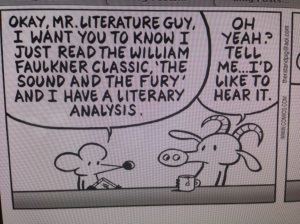
I must admit that I was challenged when reading Faulkner’s The Sound and the Fury in preparation for its theatrical production by the Elevator Repair Service ( I do not know the significance of their name). The novel was first published in 1929. Having read Faulkner’s As I Lay Dying, (one of my favorite novels in high school) I was excited to hear that a play was going to be made of The Sound and the Fury, one of Faulkner’s greatest works. I wasted no time purchasing my ticket because I knew it would be a hot seller. I knew that I would have to read the text to better understand the play because Faulkner is a complex writer of southern literature who uses dialect and stream of consciousness to a great height to convey his themes. Thus, I approached The Sound and the Fury with great excitement and courage. I had about six months to read the book once I purchased my ticket (One would have thought that this would have been more than enough time). Even though I had the novel for months, I waited until a few weeks before the show to start reading it. Unfortunately, as I started reading it, I knew that I would not finish the book in time. The complexities of the characters and the stream of consciousness in which Faulkner wrote proved at first to be a hindrance to comprehension and to maintaining my interest.  When I saw the play, I also had great difficulty maintaining concentration because it followed the first chapter verbatim, with all its stream of consciousness and narration. I decided after the show that I would look back at the text and finish it no matter the difficulty, and that I would see the show again (Had I just disciplined myself the first time, I would have saved $55). I am proud to say that not only did I complete the novel, but I am revisiting the first chapter again to see if it was as difficult as I first thought. Needless to say, since I now understand the character development, the first chapter now makes complete sense.
When I saw the play, I also had great difficulty maintaining concentration because it followed the first chapter verbatim, with all its stream of consciousness and narration. I decided after the show that I would look back at the text and finish it no matter the difficulty, and that I would see the show again (Had I just disciplined myself the first time, I would have saved $55). I am proud to say that not only did I complete the novel, but I am revisiting the first chapter again to see if it was as difficult as I first thought. Needless to say, since I now understand the character development, the first chapter now makes complete sense.
The title, The Sound and the Fury, is taken from Shakespeare’s Macbeth when Macbeth says, “…It is a tale Told by an idiot, full of sound and fury Signifying nothing.” Indeed this is a tale told by “an idiot and others, but it signifies everything. Faulkner creates a story in four chapters, with each chapter having a different narrator. The first chapter is told by Benjy, the “idiot”; the second chapter is told by Quentin, an obsessed older brother; The third chapter is told by Jason, a bitter and angry brother, and the last chapter is told by Dilsey, the “Negro” maid and child-rearer for the Compson family. This story is about the economic and social loss that a family faces as a result of some devastating events. It is a story about the prejudices that people have toward others who are different from themselves ethnically, nationally, racially, and intellectually. It about making judgments about people without knowing anything about them. It’s about people believing that your genetic makeup automatically predisposes you toward either good or evil. Pejorative terms for blacks, whites, developmentally delayed people, and women are all used in the novel to give the reader a sense of the sentiment of the time toward people of various backgrounds. The novel is extremely detailed, and I cannot do justice in this blog to the many motifs of the novel. The use of the “N” word in the text will be the focus of this post. In keeping with the novel, I will use the word Negro when referring to African-Americans from the text. I will use nigger when it is used in the text, and I will use African-American when speaking of blacks during the current time period.
Faulkner exposes racial prejudice thoroughly. Throughout the text, he shows how deeply it is embedded within the American culture, not just southern culture. Quentin states in the novel,
I used to think that a Southerner had to be always conscious of niggers. I thought that Northerners would expect him to. When I first came East I kept thinking You’ve got to remember to think of them as colored people not niggers, and if it hadn’t happened that I wasn’t thrown with many of them, I’d wasted a lot of time and trouble before I learned that the best way to take all people, black or white, is to take them for what they think they are, then leave them alone. That was when I realised [sic] that a nigger is not a person so much as a form of behavior; a sort of obverse reflection of the white people he lives among.
In spite of these thoughts that Quentin espouses, he continues to use the “N” word contemptuously. Consciously he knows that people should be evaluated individually, but he still sees people collectively rather than individually. Is it possible for Quentin to cease this behavior? Webster’s dictionary defines nigger as a disparaging word for black people. If nigger is a behavior, and not a specific group of people, why do many African-Americans continue to use the word? African-Americans of various socioeconomic classes use the word as a term of endearment (As far as I am concerned there is no distinction between niggah, nigger, or any variation of the word). Throughout the novel, the blacks continue to call each other niggers. They never seem to see themselves as anything other than what they have been called. This is a case of art imitating life.
If a group of people have been called a pejorative term for hundreds of years, is it realistic for them not to think of themselves as the very thing that they been have been called? When a person is called something, it becomes normal to call oneself that very thing. It takes much self-determination to call oneself something other than what he has been called for centuries. It takes even more self-determination to think of oneself as something else. If we as African-Americans are not able to see ourselves as something other than a nigger, how will anyone else see us for the intelligent people we are? How can we change the collective attitude of the masses? Is it even possible? According to Jason, the angry brother, “When people act like niggers, no matter who they are the only thing to do is treat them like a nigger.” He is referring to Miss Quentin’s (she is white) behavior. His comment about her reminds me of a black man on the train who said to a white man, “You are a dumb white nigger.” That was the first time I ever heard a black person call someone white a nigger. Clearly this was not based on the color of his skin, but based on the behavior. The comment, however was still disparaging.
Additionally, even the Negroes disparage each other. Dilsey, the African-American maid is no exception. When talking to Lester, she says, “Dont [ sic] you lie to me, nigger boy.” Furthermore, more evidence of racial prejudice toward the blacks to each other is depicted. For example, on Easter Sunday, “the Negroes” are expecting a great Negro speaker for their service. They have high hopes that this speaker will be someone great. Dilsey, the narrator, gives us a glimpse into the thoughts of the Negro congregants about the appearance of the speaker. She says when they see him, however, he is “…undersized, in a shabby alpaca coat. He had a wizened black face like a small, aged monkey. The congregation looked “…at him with consternation and unbelief when the minister rose and introduced him in rich, rolling tones whose very unction served to increase the visitor’s insignificance.” We also know from the narrator that “When the visitor rose to speak he sounded like a white man. His voice was level and cold. It sounded too big to have come from him and they listened at first through curiosity, as they would have to a monkey talking.” Faulkner, thematically is saying that the “Negroes” too, judged a person by appearance. Because the man’s voice sounded to big, the congregants thought he sounded like a white man. The narration reminds me of the many times when I hear African-Americans say that when, we, African -Americans talk “proper” we sound white. African- Americans have expectations of each other based on race. When black or white people fall short of our ideals, we disparage them.
Faulkner was very ingenious in how he wrote the novel. He makes serious statements about humanity’s prejudices from various angles. The questions that we are left to ponder include the following: Is it possible for African-Americans to stop using the ‘N” Word? Is it too deeply embedded within our culture? Is there anything that can be done to make the word obsolete? Is it possible to stop prejudging people based on artificial classifications that do not determine character? Is character in any way determined by one’s blood? Let me know your thoughts. Comments welcome. A review of the play will be posted after I see it again on June 18, 2015.

Very thought-provoking response. When I teach To Kill a Mockingbird we have a discussion about our comfort level in using labels that carry such high emotional value.
LikeLike
Character is not genetic and everything can and (in this matter) it must be changer. Racism can be perpetrated through the use of the same choice of words, regardless of who uses them.
We have to remember that words are powerful and carry meaning, a precise meaning, even when we’re not thinking about it.
The n word, in all western cultures (not just the USA), must be eradicated.
LikeLike